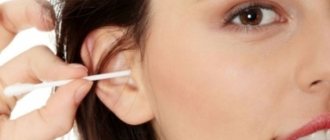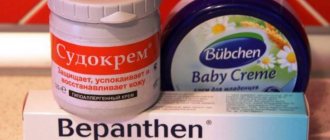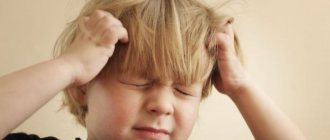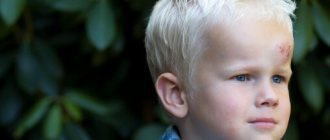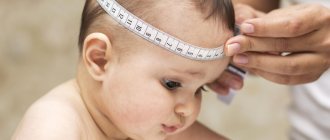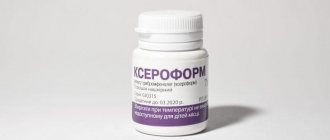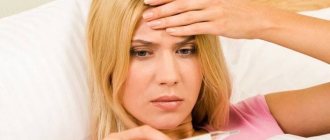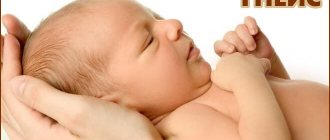If a child constantly scratches his head, he needs to be shown to a dermatologist, who will tell him what to do in this situation.
If a mother begins to notice that her child systematically scratches his head, she should observe at what exact moment he does this in order to determine the cause of such a suspicious habit. Sometimes children scratch their heads while watching TV or reading a book, but more often when they are thinking deeply about something. So the question is, is this habit dangerous and can it indicate the presence of a certain disease?
Reasons for scratching a child's head
If a child constantly scratches his head, a number of explanations can be found for this. For example, his head may itch if he hasn't washed his hair for a long time. How to explain this? Everything is simple here: being in constant activity, the baby regularly sweats, and his head sweats, as a result of which the pores of the skin become clogged and it loses the ability to breathe. This results in a feeling of discomfort, which is abruptly replaced by unpleasant itching and tingling.
In addition, the child may have an itchy head due to the presence of an allergic reaction, but in this case, other areas of the skin will also itch, on which a small allergic rash may also appear. Fungal infections, which can be eliminated primarily through medication, cannot be ruled out. Among the reasons for this phenomenon, pediculosis should be mentioned, but such a disease will be obvious to parents as soon as they look at their child’s hair. In the latter case, it should be clarified that the disease is infectious, so it is possible that in the near future the head will begin to itch in a loving mother.
Psoriasis
The causes of psoriasis are still unknown. Many experts suggest that the disease is caused by stress, hereditary factors, poor environment, low immunity and hormonal imbalance. At the initial stage, the child may develop red spots on the back of the head, causing unpleasant itching.
As the disease progresses, they spread throughout the scalp. A person with psoriasis may also notice pink patches on the elbows and knees with small flakes of dry skin.
If your child scratches his head frequently, he may have psoriasis. The first manifestations of this disease often appear on the back of the head. Outwardly, this may look like slight peeling of areas of the skin. Over time, the peeling becomes more noticeable, irritation and quite severe itching appear. Reddish spots may also appear on the knees and elbows.
Unfortunately, scientists have not fully figured out what triggers the onset of this disease and how to treat it. Psoriasis is not an infectious pathology. But it is not yet possible to cure it completely. The doctor will prescribe medications that improve the condition of the skin and detoxify the body. In severe situations, treatment is carried out with corticosteroids.
The danger of such a habit
If, after a thorough examination of the scalp, the parent is convinced that the child has no head lice or allergies, and the head is well-groomed and clean, then there is no reason to worry. Or does it still exist?
This habit is also dangerous for the baby’s health, since with his rash actions he can sooner or later scratch the scalp until it bleeds, and if such scratching gets into a pathogenic infection, a disease such as vulgar impetigo can develop.
In addition, the penetration of infection into the wound can provoke rapid blood poisoning. That is why a caring mother should regularly trim her child’s nails, and also make every effort to rid him of such a bad habit.
Preventive measures
In order for a child to stop constantly scratching his head, the cause should be eliminated as quickly as possible and existing diseases should be cured. But even after the situation has returned to normal, regular prevention of skin lesions should be carried out. Moreover, doing this is not so difficult:
- The child's head should be washed regularly and very thoroughly.
- It is necessary to select gentle detergents that suit his age and hair type.
- When washing, it is important to use only special children's products.
- It is necessary to comb the hair only with his own comb, and it is very important to convey your requirement to the teachers.
- It is important to wash and iron children's bedding, towels and hats regularly.
- It is necessary to ensure that the child’s head comes into contact only with natural materials.
- During walks, it is necessary to constantly monitor the baby and stop attempts to play with sick animals.
Preventive measures can also include a balanced diet, taking multivitamins, and regular sunbathing. And if problems are discovered, you should not let the situation take its course. Timely consultation with a specialist will help improve the situation and avoid additional problems.
Eliminating a bad childhood habit
So, first, an alarmed mother must find out why the child is scratching his head, and only then take measures to eliminate this habit. First you need to examine the baby's hair for the presence of lice, which also cause severe itching. In addition, it doesn’t hurt to examine the scalp to make sure that there is no allergic rash or pathogenic fungus on it. It is recommended to review the child’s daily diet, eliminating all possible allergens from it. If allergies are present, antiallergic agents for internal use, preferably of plant origin, are also indicated.
In case of severe itching, to relieve the general condition, you can prepare an infusion of the fruits of ordinary raspberries or blue blackberries; a decoction of stinging nettle herb or garden parsley rhizomes. These medications should be taken orally according to the instructions on the package.
Whatever the reasons for a child’s scalp itching, he needs to make an appointment with a dermatologist so that a qualified specialist can find out whether it is a habit or a disease.
Itching on your child's head is not life-threatening, but may cause irritation until the problem is resolved. There are several reasons why a child may scratch their head. Two of the most common include eczema and head lice.
Allergic reaction
Many people feel the urge to scratch their head in a stressful situation. Children are more likely than adults to experience strong emotional outbursts. The more often a child touches his head, the more the skin becomes irritated and the itching intensifies.
When a child scratches his head behind the ears, he may have an allergic reaction to some food. In this case, redness or rashes will not necessarily be observed. The scalp is much denser than other parts of the body, so rashes here may appear later.
To fix the problem, try to find its source. Think, perhaps you purchased a new shampoo or washing powder? Have you given your child new foods? Have you treated any disease with unusual medications?
As soon as the cause is established, eliminate the effect of the allergen and after a while the situation will improve.
Causes
Eczema
refers to a number of skin diseases that cause irritation, redness and itching. About 1 in 10 children develop the condition, according to ChildHealth.
Other causes of a child scratching their head include head lice ( lice).
) or
ringworm
.
Pediculosis can lead to inflammation and itching of the scalp. It may take several weeks for a child with lice to begin to itch, depending on how sensitive their skin is. Lice are highly contagious and spread easily from person to person, especially in schools where children are very close to each other.
Ringworm is a fungal infection most often found on the scalp. Its appearance is similar to a red ring or group of rings with a clear center. This infection causes the child to experience itching.
Eczema Ringworm Pediculosis (lice)
Ringworm
Sometimes the disease that undermines your health is ringworm. Severe itching is one of the symptoms. The disease is contagious. You need to prepare for sick leave. If a parasite such as a louse does not bother you, another parasite, a fungus, may. It is the fungal microorganism that causes ringworm. It affects the skin and changes its structure. The immune system strengthens over the years, and is especially vulnerable in childhood. Therefore, ringworm easily takes root in the body of children aged 4 to 14 years and progresses quickly. Some forms are transmitted from person to person, others from pets.
Signs
Signs that your baby may have eczema usually appear before he is 3 months old and almost always before he is five years old. Symptoms include dryness, itching, redness and small bumps on the cheeks, forehead or scalp. The rash may spread to other parts of the body.
Lice can be seen by examining a child's head. Nits (lice eggs) look like tiny yellow or brown dots before they hatch. Adult lice are grayish-white or brown and no larger than a sesame seed.
Ringworm may start out as round, reddish, pimple-like sores and then become flaky, scaly, or crusty, causing an itchy scalp. It can also cause swelling, redness and hair breakage.
Treatment
Corticosteroid ointments are commonly used to treat eczema. More than half of children with eczema will continue to have it into adolescence, according to KidsHealth. And only a small number of people will have it in adulthood.
Treatment for head lice involves using a special shampoo or lotion to kill lice. You should not use medicated shampoo on children under two years of age. You will need to remove nits and lice by hand. You should also wash all bedding and clothing, vacuum carpets and furniture, and soak hair care products and tools in alcohol.
Treatment for ringworm capitis involves taking prescription oral medications.
Pediculosis
Another common reason that a child scratches his head can be the notorious lice. Unfortunately, lice is a highly contagious disease. It is enough just to play next to the patient in the same sandbox or sit at the same desk.
Long gone are the days when you got rid of uninvited “guests” using kerosene or smelly dust soap. Modern drugs are readily available, easy to use and smell pleasant. Among the popular ones are “Para Plus”, “Pedikulen” or “Nittifor”. Just 1-2 treatments, and the lice will leave your child's head.
But at the same time, you should definitely treat the heads of all family members, boil and iron all bedding and clothing on both sides.
What to do?
In addition to the fact that it is important to contact your pediatrician if you experience a rash or skin changes, you should listen to the following tips.
Change your bathing routine
Sometimes a child may start scratching his head out of irritation while bathing. Washing your hair every day or using hot water can cause irritation. Dr. Jim Sears says you should wash children's hair about once a week, and that doing it more frequently can dry out the scalp, making it itchy. If your child's hair becomes dirty, you should rinse it with warm water first.
Changing shampoo
Many shampoos have harsh chemical ingredients that can dry out the scalp, even those made for children. If a child suffers from an itchy scalp, parents can try switching to a shampoo specifically designed for sensitive skin. The American Academy of Dermatology recommends choosing shampoos that do not contain fragrances or other additives. Parents should look for a product that is formulated specifically for children, as they have more sensitive skin than adults and some shampoos and soaps can irritate it.
Gentle care
Parents can help minimize scalp irritation by practicing gentle hair care. Instead of drying your hair with a towel or using a hair dryer, you should lightly dry it with a towel or let it air dry. You can plan some inactive play or storytime after your bath to let your hair dry before bed. Using a soft brush can also be gentler than plastic or hard ones.
Hydration
If your scalp is irritated, a good moisturizer can help soothe it and relieve itching. Olive oil and baby oil are good options for children as they are natural and will not irritate the skin. If there are scabs or scabs on the scalp, parents can rub a little oil into the areas to soften them. The oil must be completely washed out with shampoo after a few minutes, or it may lead to a rash.
If your child scratches his head from time to time, then don't be alarmed right away.
This may be due to a variety of reasons - from hair that hasn’t been washed for a long time to deep thoughtfulness, seen in a cartoon about Winnie the Pooh. But if the scratching becomes chronic and does not stop for some time, then you should think about it.
It can be a manifestation of many diseases. Before you run to the doctor, examine your child’s head yourself and observe how often and with what frequency the itching occurs. This will help you determine the nature of the problem and decide which specialist to contact.
Why do you want to scratch your head?
(0 votes, rating 0 out of 5)
Each of us scratches one or another part of the body from time to time, be it the head, neck, arms or in the genital area. Few people pay special attention to this, believing that this is quite normal. If you notice that the back of your head itches too often, you might want to consider whether everything is okay with you.
Sometimes scabies is so severe that a person's hair begins to fall out. In this case, red spots may also form on the skin. This is the first sign of the presence of the disease. In some cases, people begin to scratch this part of the body when they are nervous. There is a risk of injury. The skin can be damaged by intense scratching, resulting in wounds. However, this is only a special case.
Itching can be a sign of various diseases, the treatment of which should begin immediately. Otherwise, in order to eliminate unpleasant symptoms in the future, you will have to spend a lot of time and money. It is better not to delay going to the doctor. Many people think that if I scratch my head, it just means it's time to wash my hair. Some people associate this with certain folk signs.
Causes
If you notice that you want to scratch the back of your head too often, don't panic right away. Even with certain diseases, they do not pose any threat to the body. At the same time, everyone should understand that if I scratch the back of my head too often, this is the first signal to contact a dermatologist. Only he will be able to give an exact answer as to why this is happening, determine the causes and prescribe an appropriate course of treatment.
If you or your child scratches the back of their head frequently, it may be due to:
- the presence of lice or mites on the skin. This becomes possible in cases where a person does not adhere to basic hygiene rules. You should wash your hair at least several times a week. In this case, the probability of the appearance of such insects is reduced to almost zero;
- eczema. This is a fairly common disease nowadays. In addition to itching, the patient will also be able to observe redness in certain areas of the skin and severe peeling. It is simply impossible to confuse this disease with dandruff;
- seborrheic dermatitis. The signs of this disease are almost identical to those of eczema. In this case, the skin becomes very dry or, on the contrary, very oily, which is directly related to the disruption of the sebaceous glands. Children often suffer from this disease;
- skin diseases caused by fungal infections. They arise as a result of non-compliance with hygiene rules. In most cases, it is possible to get rid of unpleasant sensations in just a few weeks. To do this, you must strictly adhere to the doctor’s instructions, using special products every day that prevent the proliferation of fungal bacteria;
- allergy. If I scratch my head, it means that it is quite possible that this is just the body’s reaction to certain irritants. They can even be food. In the overwhelming majority of cases, we are talking about an incorrectly selected shampoo;
- pediculosis or demodicosis. These are one of the most common diseases, in which the characteristic symptoms are itching, dandruff and irritation on the skin;
- hormonal imbalance. In most cases, this problem occurs in women, especially often during pregnancy. If you observe such an unpleasant symptom, you should consult a doctor;
- failure to comply with hygiene rules. If you sweat often, but wash your hair less often than once every 4-5 days, most likely you will sooner or later encounter a problem such as scabies in the back of the head. This creates the most comfortable conditions for the development of harmful microorganisms. As a result, you will develop dandruff and will also experience constant itching.
What to do
If you want to find out the reason why the back of your head itches, and also get rid of the unpleasant sensations, you should consult a doctor. Determining the cause of itching on your own will not be so easy. To establish an accurate diagnosis, in addition to being examined by a doctor, you will also need to undergo a series of tests. Only in this case can you be sure that the cause of the itching will be accurately determined.
To determine the diagnosis, in most cases you will have to undergo the following tests:
You can most often find out the results within 24 hours. In some cases, video hair diagnostics is performed to determine the causes of itching. This service is quite accessible, but not all clinics and hospitals can offer it.
If you or your child constantly scratches the back of their head, don't expect it to go away on its own. Timely diagnosis and correct diagnosis is half the battle.
Who to contact
If you want to know the exact diagnosis and establish the reasons why you want to scratch the skin in the back of your head, an ordinary therapist is unlikely to cope with this task. You need to see a specialist doctor. In this case, see a dermatologist. First of all, a visual examination of the patient takes place, which makes it possible to diagnose more than half of the known diseases. If a specialist has doubts, then it will simply be impossible to do without testing.
Only a qualified doctor can answer the question of what to do if I scratch my head, so it’s better not to experiment. This way you can cope with itching in the shortest possible time.
Prevention
In order to avoid such a problem, it is necessary, first of all, to adhere to the rules of hygiene. It is this that becomes the main reason why the back of the head begins to itch. Don't forget about immunity. It is better to take a course of vitamins twice a year, which will make it much easier for the body to resist various infections. In any case, you should not take such a problem very seriously. Even if I'm scratching my head, it doesn't mean that life is over. Yes, this brings some discomfort, but timely treatment will help you get rid of this unpleasant symptom.
mediqs.ru
Why does a child scratch his head?
The most common reason that a child has a poorly washed head.
Detergent residue irritates delicate skin and causes itching. If you are sure that you wash out the shampoo well, try changing the product. The next fairly common reason is. In this case, the child may even experience constant itching, as a result of which the child may injure the scalp.
Often a child scratches his head due to neurosis. Even if you are completely sure that the child lives in an ideal world for psychological health, he may have hidden problems, including uncontrollable scratching. Watch your child. If you suddenly notice any other signs of neurosis - changes in habits and preferences, problems with sleep or appetite, headaches, problems with speech, changes in behavior, then you should immediately contact a child psychologist. Many people prefer to talk to the baby themselves in order to help him, but, unfortunately, this can most likely cause harm.
If a girl scratches her head endlessly, especially in the evenings, think about whether you are braiding your daughter’s hair too tightly. Severe tension on the hair roots can cause quite severe itching and headaches. The easiest way to solve this problem is to avoid making tight ponytails, especially, and switch to more gentle hairstyles, such as various braids.
If a child scratches his head, this may be a symptom of various fungal diseases. The most common of these is psoriasis, but it is usually visible to the naked eye (). Other fungi do not affect hair, so they can live for years on the back of your child’s head, manifesting themselves only in itching or flaking. If none of the listed problems are confirmed, consult a doctor immediately. After all, itching can be a manifestation of very serious diseases of blood vessels, skin, and even diabetes. In this case, it is very important to make a diagnosis and start treatment on time.
A baby in the first months of life, due to a temporary lack of ability to speak, intuitively shows his parents what and where is bothering him. A child picks or scratches his ears for various reasons: attentiveness, patience and independent examination of the baby will help parents determine the prerequisites for such behavior and decide on further tactics.
Bad habit or neurosis
Sometimes a child scratches his head, just trying to attract attention. And in some cases it turns into a bad habit. The baby unconsciously scratches the top of his head without even noticing it.
The situation is much worse when “pruritus” is a consequence of neurosis. Watch your baby carefully. You may notice other symptoms:
- changing habits;
- refusal to eat;
- depressed mood;
- problems with pronunciation;
- changes in behavior;
- frequent headaches for no apparent reason;
- sleep disorders.
If you find anything like this, it is best to seek advice from a psychologist. A good specialist will help the child talk and find out the cause of mental anguish.
Causes of itching in the ears of a small child
If the baby, when scratching or rubbing his ear, calms down in his mother’s arms or is easily distracted from his activity, then the reasons that caused the discomfort can be eliminated without going to the clinic. Otherwise, consultation with a pediatrician is required. The prerequisites for this will be:
- prolonged crying of the baby, including when swallowing food or milk - more than 3-6 hours;
- refusal to lie on your side with an itchy ear;
- temperature increase;
- bloody wounds from scratching around or behind the ear, scabs;
- obstruction of examination of the auricle - the baby is spinning and crying a lot;
- unpleasant odor from the ear, purulent discharge;
- decreased appetite and sleep quality;
- small objects caught inside the ear canal.
If there is an unpleasant odor coming from the auricle and/or you find purulent discharge, an ENT examination should be arranged as soon as possible
Diseases that cause itching
If your baby's ears are constantly itching, this may be a symptom of serious diseases:
- otitis, including its purulent form - the most dangerous disease, which without proper treatment causes complications from the hearing organs;
- allergies - when the baby scratches not only his ears, but also his face, a runny nose suddenly appears;
- skin fungus, which appears when the hygiene of the child’s body and the room in which he lives is violated;
- eczema – rare;
- lice, when a child scratches his ears, the back of his head due to insect bites (we recommend reading:);
- psoriasis, neurodermatitis - plaques with affected areas of the skin spread beyond the ears to the head and body.
The ears and throat are anatomically connected through the auditory tubes, so sore throat and other colds due to inflammatory processes provoke a feeling of discomfort. The baby, struggling with the unpleasant sensation, reaches out with his hand and scratches his ear.
A visit to the doctor is also required in cases where the baby accidentally inserts a small object into the ear. Since the sensitivity of the skin is high and the size of the ear is small, independent manipulations to remove it can be dangerous for the baby’s health.
Other causes of discomfort
Harmless reasons that provoke itching in the ears of a baby are:
- drowsiness - with their fists the little ones rub not only their eyes, but also their ears and the whole head;
- peculiarity of the development of the baby’s nervous system;
- studying his body - the baby touches, pulls his earlobes with interest on his face;
- pain during teething, especially typical for infants 6-8 months old;
- sulfur plug;
- accumulation of sulfur on the walls of the passage or, conversely, its deficiency due to excessively thorough and frequent removal;
- overheating - the child sweats and tries to relieve the itching on the back of the head, neck, ears (we recommend reading:);
- hypothermia;
- microcracks in the ear canal formed after cleaning the ears;
- a mosquito bite, which is visible as a red swelling of the skin;
- small insects getting into the ear canal;
- stagnation of water after water procedures;
- age-related seborrheic dermatitis, which goes away without treatment in the first 3 months of a baby’s life, less often it persists until the age of 4.
Swollen ear after a mosquito bite
There are cases of hereditary predisposition to excessive or insufficient production of wax in the ears, as a result of which they often itch. Lack of knowledge about the health status and diseases of the baby’s relatives leads to groundless assumptions in this regard.
What to do if a baby’s ears itch and how to treat it?
Dear reader!
This article talks about typical ways to solve your issues, but each case is unique! If you want to know how to solve your particular problem, ask your question. It's fast and free
!
If parents are concerned about the baby's behavior and are trying to understand why the child is scratching his ears, then they should check their condition, as well as evaluate the areas of skin on the head and back of the head. If you can see seborrheic plaques or areas scratched until they bleed behind the auricle, it is better to immediately go to the doctor for a consultation (more details in the article:). There is a high probability of a disease requiring complex treatment.
The presence of small red bites on the temples and back of the head, behind the ears indicates lice in the baby. The mosquito bite area outside or inside the ear, located near the exit, can be treated with an itching reliever. Pay attention to the label of the drug and the admissibility of use for an infant. If you have doubts about the type of insect that bit your baby, it is better to visit the clinic.
Antihistamines are used to relieve itching due to allergies. They are prescribed by the doctor after consultation and examination of the child.
If a fungal or bacterial disease is detected in the baby, then tests will be required before prescribing treatment. The specialist will determine the optimal regimen to alleviate the baby’s condition and prescribe the necessary medications. In addition to drug therapy, the doctor will prescribe physiotherapy and warming the ear with an ultraviolet lamp.
Treatment for each child is prescribed individually, based on the etiology of the disease, the degree of neglect and the age of the baby.
Prevention of ear itching
To choose the right way to eliminate itching in a child, you should find out why the ear itches. If the cause is temporary and is not a symptom of the disease, parents are able to identify the problem without seeing a doctor. Below are a number of causes of itching and preventive measures:
- If a child's ears itch due to allergies, you should know that it manifests itself not only in flowering plants, animal hair, food, but also in dust settling on furniture, the composition of powder for washing children's underwear, baby shampoo, soap, gel , lotion (we recommend reading: ). Adjusting the diet of the baby and the mother, if he is breastfed, will relieve the baby of food allergies. If the body reacts violently to household chemicals, replacing personal hygiene and laundry care products will help.
- Developing and observing a strict daily routine, when the baby sleeps, is awake and walks in the fresh air, will relieve him of nervousness and drowsiness.
- Following the rules of ear hygiene, cleaning them after washing your hair with special cotton swabs no more than once every 7 days will minimize injury to the delicate skin of the ear canals. Too sudden movements and deep penetration into the ear canal should be avoided, so as not to cause pain and further refusal of the baby from the procedure.
- Checking the ears after cleaning them to ensure that there are no remaining cotton wool fibers will eliminate tickling of the skin inside and, as a result, nervousness of the baby.
- Understanding the periods of development of the baby, when he is teething, checking the condition of his gums helps young parents find a way to relieve pain with the help of cooling gels, special toys with a massaging effect (we recommend reading:). The eruption process begins at 5-9 months.
- Skin-to-skin contact, satisfying the baby’s desire to be closer to his mother is the best cure for fears, nervous tension and anxiety.
A child may start scratching his head as early as 4-5 months. In some children it occurs only during the day, while in others it occurs at any time of the day. If you notice that your baby is itching for a long time, the very first thing you need to do is change the pillow. Very often, all the reasons for the baby’s anxiety come down to poor quality material and filling of this product. In general, it is best to replace a small child’s pillow with a flannelette diaper folded several times. If your baby does not like to sleep on a flat surface, you can place a special orthopedic pillow under his head.
Orthopedic pillows will not allow the child to roll over onto his stomach and bury his nose in the blanket. They also prevent the development of curvature of the baby’s cervical vertebrae.
The causes of head scratching in a child include a disease such as rickets. Because if a child does not have enough vitamin D in his body, he sweats more. The sweat produced is very salty, which causes the skin to become irritated and itchy.
Another reason that can be called one of the more common is allergies. Moreover, allergic rashes on the baby’s head may not be immediately noticed, because the scalp is denser. But regardless of this, the child begins to be bothered by itching and scratches his head.
Older children may scratch their heads for no reason or to attract attention.
This can cause them to develop a bad habit that will be difficult to break.
Personal hygiene
In some situations, scalp problems occur because the shampoo is not suitable or because the child's hair is not washed often enough. Personal hygiene rules are a skill that is part of socialization and must be mastered. The process is subject to the laws of nature and depends on the characteristics of the nervous system. Adults have to monitor compliance with personal hygiene rules for quite a long time. The child’s body must be fully formed and strengthened.
How to get rid of itchy scalp in babies
In order for the baby to stop itching, you need to find and eliminate the irritant. Specialists such as a pediatrician, allergist, and neurologist can help find the cause of itching. But in no case should you leave it to chance, because even seemingly harmless scratching can lead to unpleasant consequences. After all, at the site of scratching, wounds may appear, into which any infection can easily get. If you cannot cope with your child’s itchy scalp on your own, you should consult a specialist about this problem.
Seborrheic dermatitis
If dandruff is detected upon examination of the head, seborrheic dermatitis may be the cause of the itching. Factors causing pathology:
- hormonal imbalance in adolescents;
- recent illness;
- taking medications;
- poor nutrition and metabolic disorders;
- stress;
- heredity.
With seborrheic dermatitis in a child, the composition or amount of sebum changes. The scalp may become oilier or drier. Some people have oily skin in some places and dry in others. Scientists suggest that the disease is caused by a specific fungus located on the epidermis, but activated under certain conditions.
